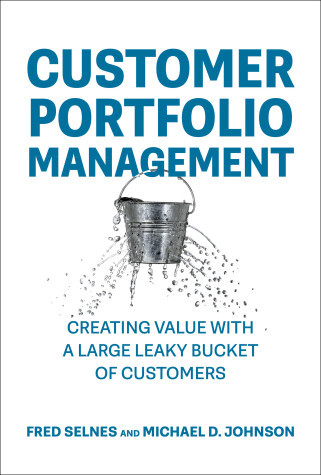Management on the Cutting Edge
1 total work
How to create value with all the customers in a portfolio, from the stronger relationships that increase profit margins to the weaker relationships that increase scale.
Which would you rather have: a smaller, watertight bucket of loyal customers or a larger, leaky bucket of both loyal and not-so-loyal customers? In Customer Portfolio Management, Fred Selnes and Michael Johnson argue that for most companies and organizations the larger leaky bucket is more valuable. While loyal customers are generally more profitable, the weaker, or “leaky,” relationships in a portfolio provide scale economies and a source of future loyal customers. The basic principle behind customer portfolio management (CPM), they explain, is to view a company’s market strategies as long-term investments in the strength of relationships over an entire portfolio of current and future customers.
This book helps business leaders understand when and how much to focus on acquiring customers, how to defend and leverage those relationships, and how to convert some of these relationships into stronger, more profitable ones. The authors present an implementable framework for CPM that involves:
(1) segmenting customers into strangers, acquaintances, friends and partners;
(2) understanding the lifetime value, or revenues and costs over time, across relationship segments; and
(3) determining when and how much to invest in customer acquisition, relationship defense, relationship leverage, and relationship conversion.
Case studies and examples that include Amazon, Apple, IKEA, and dozens of other companies are used along the way to illustrate effective portfolio management principles and growth strategies.
Which would you rather have: a smaller, watertight bucket of loyal customers or a larger, leaky bucket of both loyal and not-so-loyal customers? In Customer Portfolio Management, Fred Selnes and Michael Johnson argue that for most companies and organizations the larger leaky bucket is more valuable. While loyal customers are generally more profitable, the weaker, or “leaky,” relationships in a portfolio provide scale economies and a source of future loyal customers. The basic principle behind customer portfolio management (CPM), they explain, is to view a company’s market strategies as long-term investments in the strength of relationships over an entire portfolio of current and future customers.
This book helps business leaders understand when and how much to focus on acquiring customers, how to defend and leverage those relationships, and how to convert some of these relationships into stronger, more profitable ones. The authors present an implementable framework for CPM that involves:
(1) segmenting customers into strangers, acquaintances, friends and partners;
(2) understanding the lifetime value, or revenues and costs over time, across relationship segments; and
(3) determining when and how much to invest in customer acquisition, relationship defense, relationship leverage, and relationship conversion.
Case studies and examples that include Amazon, Apple, IKEA, and dozens of other companies are used along the way to illustrate effective portfolio management principles and growth strategies.
